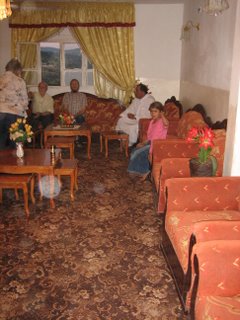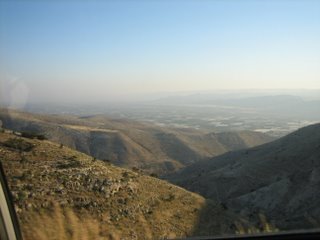
Jordan is a traditional society. Or, perhaps more specifically, Jordan is a country of traditions. For instance, just in the area of language, there are specific words and phrases it is appropriate to say when greeting people, when welcoming someone who has arrived safely after a long trip and when serving or receiving food. There is even a phrase that is used after a person receives a haircut. Also--as discussed in the previous post--there is the tradition of serving tea or coffee, which is part of a larger tradition of showing hospitality.
Although these traditions--along with many others--are of course evident in Amman, nowhere are they more visible than in the smaller towns and villages that dot the countryside. Annamarie and I have had the opportunity to experience this during our first three months in Jordan by visiting a small village of a few hundred people about an hour north of Amman several times with some friends. Some of the traditions in evidence there are:
THE GREETING
Exchanging kisses on the cheek--with those of the same sex--is an important part of most greetings in Jordan. However, in this particular village the greeting consists specifically of one kiss on each cheek followed by two kisses on the cheek on which the kissing began.
THE WATER
Upon arrival at someone's home in this village, a single glass of water is immediately brought out for the guests. This single glass is passed around and refilled until everyone has had their fill.
THE BEVERAGES
Soon after arrival, a beverage is brought out. As mentioned in the previous post, most times this is either tea or coffee. However, in hot weather, Pepsi, Coke or 7-UP is sometimes served instead. Soft drinks are also, though, sometimes served before coffee. In the village, we usually go around and visit many different families, and this means drinking a lot of tea and coffee. One day--which included visits to three wedding parties as well as visits to various homes--I drank a total of 11 beverages, all caffeinated except for one. This included four cups of Arabic coffee, three cups of tea, two Pepsi's, one Coke and one 7-UP. In case you're wondering, refusal to drink would be considered impolite.
THE PARLOR
All of this greeting, visiting and drinking usually takes place in a specific room of the house or apartment set aside for such activities called the parlor. In this village, this typically is a large, rectangular shaped room with cushioned pads for seating set around the entire perimeter, with cushioned armrests in between each pad. Perhaps if the family has a little more money, this room will instead be filled--and I do mean filled--with furniture. The picture below is an example of a parlor with furniture. The couches and chairs are arranged in the same manner that the cushioned pads would be.
THE MAIN MEAL
Jordan's national dish is called Mansaf. Served on a large tray, it consists of a huge bed of rice, on top of which is either boiled chicken or lamb, topped with roasted almonds or pinenuts, and a tart, watery yogurt. Although probably not common in Amman, traditionally people eat Mansaf by rolling the rice and chicken into a ball with their hands. The family we first met from this village has this meal every Friday. Below is a picture of Mansaf, as well as one of us and this family digging in with our hands.

 These are just a few of the traditions of this village that we have come to know. Below is a picture looking out towards the Jordan Valley, taken on an excursion with the family above.
These are just a few of the traditions of this village that we have come to know. Below is a picture looking out towards the Jordan Valley, taken on an excursion with the family above.
No comments:
Post a Comment